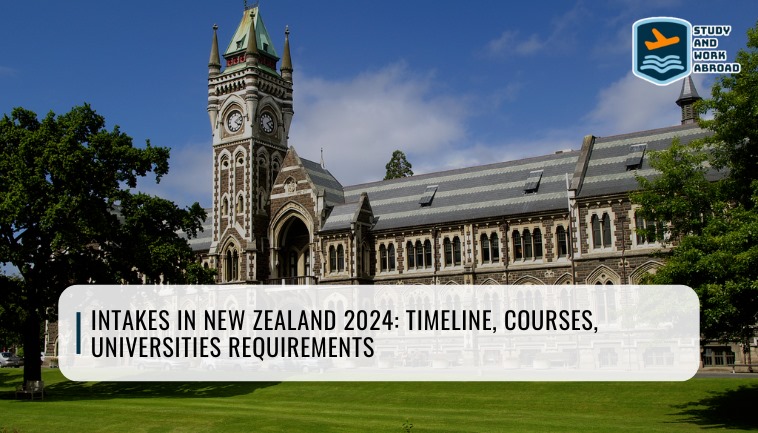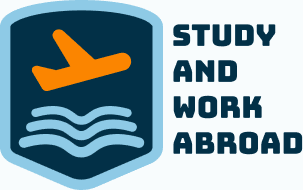Call Us:+91-9920234749 info@studyandworkabroad.in

Intakes in New Zealand 2024: Timeline, Courses, Universities Requirements
New Zealand, known for its picturesque landscapes and world-class education system, is a popular destination for international students seeking to further their academic pursuits. As we approach the year 2024, it’s important to understand the intakes, course offerings, and university requirements for studying in this beautiful country.
Intake Timeline in New Zealand 2024
The academic year in New Zealand is primarily divided into two main intakes: the January/February intake and the July/August intake. Here’s a detailed breakdown of the intake timeline for 2024:
| Intake | Semester | Deadlines | Description |
| February | Semester 1 (February to June) | December | Undergraduate and postgraduate programs are offered by universities in this intake. |
| July | Semester 2 (July to November) | June | This is a popular and preferred intake as it offers a variety of undergraduate and postgraduate courses to choose from a long list of top universities. |
| Rolling Intakes | Anytime in the year (/March/April, May, October, November) | No deadlines | Vocational courses are offered in institutes and colleges. |
Timeline for Intakes in New Zealand 2024
To help students navigate the application process, here’s a detailed timeline for the January and July intakes:
July 2024 Intake Timeline
- August – December 2023: Research and make a list of your preferred universities.
- December 2023 – February 2024: Attempt the English Language Proficiency Tests such as IELTS, TOEFL, PTE, and GMAT/GRE.
- February – April 2024: Fill out the application forms in the selected universities and upload the essential documents.
- April – May 2024: Accept the admission offer and confirm the enrolment.
- April – July 2024: Apply for scholarships, settle the funds, and apply for a student visa to New Zealand.
- June – July 2024: Purchase flight tickets and embark on a new journey.
November 2024 Intake Timeline
- February – June 2024: Research and make a list of your preferred universities.
- June – July 2024: Attempt the English Language Proficiency Tests.
- July – August 2024: Fill out the application forms and upload essential documents.
- August – September 2024: Accept the admission offer and confirm enrollment.
- September – November 2024: Apply for scholarships, settle funds, and apply for a student visa.
- October – November 2024: Purchase flight tickets and begin your journey.
January/February 2025 Intake Timeline
- April – August 2024: Research and make a list of your preferred universities.
- August – October 2024: Attempt the English Language Proficiency Tests.
- October – November 2024: Fill out the application forms and upload essential documents.
- November 2024 – January 2025: Accept the admission offer, confirm enrollment, apply for scholarships, settle funds, and apply for a student visa.
- December 2024 – January 2025: Purchase flight tickets and begin your journey.
Popular Courses in New Zealand 2024
New Zealand’s higher education institutions offer a wide range of academic programs, catering to diverse student interests and career aspirations. Some of the most popular courses in 2024 include:
Business and Management
- Bachelor of Business
- Master of Business Administration (MBA)
- Master of International Business
Engineering
- Bachelor of Engineering (Hons)
- Master of Engineering
- Postgraduate Diploma in Engineering
Computer Science and Information Technology
- Bachelor of Computer Science
- Master of Information Technology
- Postgraduate Diploma in Computer Science
Hospitality and Tourism
- Bachelor of Tourism Management
- Master of Hospitality Management
- Postgraduate Diploma in Tourism and Hospitality
Health Sciences
- Bachelor of Nursing
- Master of Public Health
- Postgraduate Diploma in Clinical Psychology
Environmental Sciences
- Bachelor of Environmental Science
- Master of Environmental Management
- Postgraduate Diploma in Sustainability
These are just a few examples of the diverse range of courses available in New Zealand. It’s essential to research the specific programs and specializations offered by individual universities to find the best fit for your academic and professional goals.
University Requirements in New Zealand 2024
To study in New Zealand, international students must meet various requirements set by the universities. These requirements may vary depending on the institution and the level of study, but generally, they include the following:
Academic Requirements:
- Minimum academic qualification: High school diploma or equivalent
- Minimum GPA: 3.0 or above (on a 4.0 scale)
- Proof of English proficiency: IELTS, TOEFL, or other recognized English language tests
Application Documents:
- Completed application form
- Certified copies of academic transcripts and certificates
- Personal statement or statement of purpose
- Letters of recommendation (usually two)
- Copy of passport
Additional Requirements:
- Portfolio or audition (for creative arts programs)
- Interviews (for some programs)
- Proof of financial resources to cover tuition and living expenses
It’s important to note that these requirements may be subject to change, so it’s crucial to check the specific requirements of the university you’re applying to for the most up-to-date information.
Conclusion
New Zealand’s higher education system continues to be a top choice for international students in 2024. With a diverse range of academic programs, flexible intake timelines, and well-defined university requirements, the country offers a world-class educational experience. By understanding the intakes, course offerings, and application process, students can make an informed decision and maximize their chances of success in pursuing their academic and professional goals in New Zealand.
Frequently Asked Questions (FAQ)
Q. What are the tuition fees for studying in New Zealand in 2024?
Ans: Tuition fees in New Zealand vary depending on the university, program, and level of study. Generally, international students can expect to pay between NZ$20,000 to NZ$40,000 per year for undergraduate programs and NZ$25,000 to NZ$50,000 per year for postgraduate programs.
Q. Can I work while studying in New Zealand?
Ans: Yes, international students in New Zealand are allowed to work up to 20 hours per week during the academic term and full-time during scheduled breaks.
Q. What are the post-study work opportunities in New Zealand?
Ans: New Zealand offers various post-study work visa options, including the Post-Study Work Visa which allow international students to work in the country for 3 years after completing their studies.
Q. How can I apply for scholarships to study in New Zealand?
Ans: Many universities in New Zealand offer scholarships and financial aid for international students. It’s essential to research the available scholarship opportunities and their application deadlines.
Q. What are the housing options for international students in New Zealand?
Ans: International students can choose from various housing options, including on-campus dormitories, off-campus student apartments, or private rentals. The availability and costs of these options may vary depending on the university and location.
